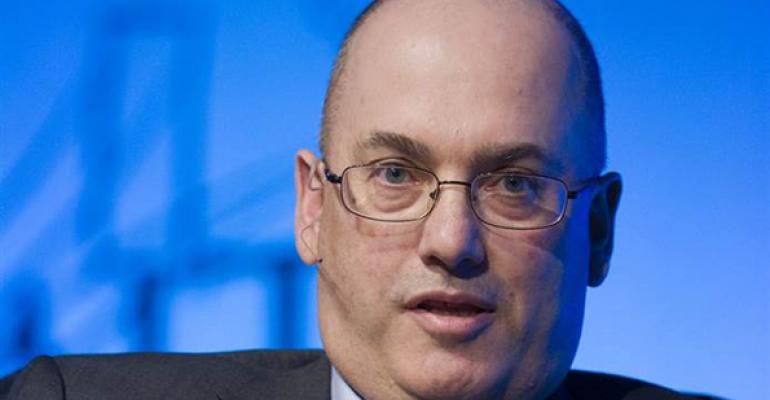By Stephen Gandel
(Bloomberg Gadfly) --There are many reasons for investors to be wary of Steven Cohen's planned mega hedge fund, but contrary to some conventional wisdom, size is not one of them.
Cohen, who less than four years ago was barred from managing money for external clients as part of a settlement related to insider trading at his former firm, SAC Capital Advisors, is plotting a return with a lot more money than when he left. Cohen would like his new fund, which could launch as early as January 2018, to kick off with as much as $20 billion in assets, according to an article in The Wall Street Journal. That would make it not only bigger than the assets managed by SAC Capital, which at its height had $16 billion, but also the biggest hedge fund launch in history.
Cohen has a big head start. He manages $11 billion of his own money through Point72 Asset Management, the family office successor to SAC Capital. That money would reportedly be rolled into the new fund, meaning Cohen needs only $9 billion in outside money. Nonetheless, even raising $9 billion would still be quite a feat, given that in general poor performance has diminished the amount of money flowing into hedge funds.
What's more, the list of reasons not to bet on Cohen is long. The top one, of course, is the insider-trading allegations. SAC Capital pleaded guilty to securities fraud in 2013 and paid a $1.8 billion fine. Cohen was never charged personally, but he did settle a civil lack-of-supervision case, which resulted in the ban, which ends in 2018. A bigger fund casts a spotlight on the supervision question. Of course, Cohen's new firm will most likely be keenly aware of its predecessor's failing, as will the new investors. But if a freewheeling culture was part of Cohen's past success, tighter supervision won't help returns.
The second problem is style drift. In 1992, SAC Capital started as one of the original high-frequency traders, accounting for 3 percent of the daily volume of the New York Stock Exchange. It rapidly bought and sold an average of 20 million shares daily, generating big returns. But when that investing style became too crowded and his fund got bigger, Cohen shifted strategy toward informational advantage. Few managers can shift styles successfully. Cohen appeared to do so, but how much of that advantage was above board has been called into question.
And there are signs that Cohen is shifting his strategy once again. Last year, he put $250 million into a firm that identifies hedge funds that invest using math-driven and computer-executed trading strategies. Quant is a pretty good choice for Cohen. It's harder to accuse computers of insider trading, and they are easier to supervise. But it's unclear whether he will be able to calibrate his formulas better than the other hedge funds in the hot space. Cohen's recent performance has not been all that impressive, with Point72's returns basically flat last year.
The concern that might just top the list of many investors -- but probably shouldn't -- is size. It's become conventional wisdom that the larger a hedge fund or mutual fund gets, the worse off it will perform. The theory seems to come from the fact that hedge funds' once-impressive performance has soured in recent years as the industry has grown. But the problem could be the number of funds, not the size of them.
Recent data suggest that the idea that size matters with hedge funds is mostly a myth. During the past decade, the average hedge fund with more than $1 billion in assets had an annualized annual return of nearly 6.6 percent. That was slightly better than funds with less then $1 billion and slightly worse than funds with less than $500 million. In the past five years, large hedge funds have actually outperformed small ones. But in general hedge fund returns don't appear to vary all that much by size.

There's some logic to that. The potential investing universe is quite large. Even another $20 billion can easily find a home. What's more, S&P 500 returns have not suffered all that much even as assets in funds that track the index have exploded. Warren Buffett, too, is an example of someone who manages a lot of money, now more than $100 billion, and still does quite well.
Buffett, though, is mostly a buy-and-hold investor who takes large stakes in companies and has been relying more and more on acquisitions to drive his performance. Cohen is so addicted to buying and selling that he travels with a specialized mobile trading desk. That should be a lot more concerning than the fund's eye-popping size.
This column does not necessarily reflect the opinion of Bloomberg LP and its owners.
Stephen Gandel is a Bloomberg Gadfly columnist covering equity markets. He was previously a deputy digital editor for Fortune and an economics blogger at Time. He has also covered finance and the housing market.
To contact the author of this story: Stephen Gandel in New York at [email protected] To contact the editor responsible for this story: Daniel Niemi at [email protected]





